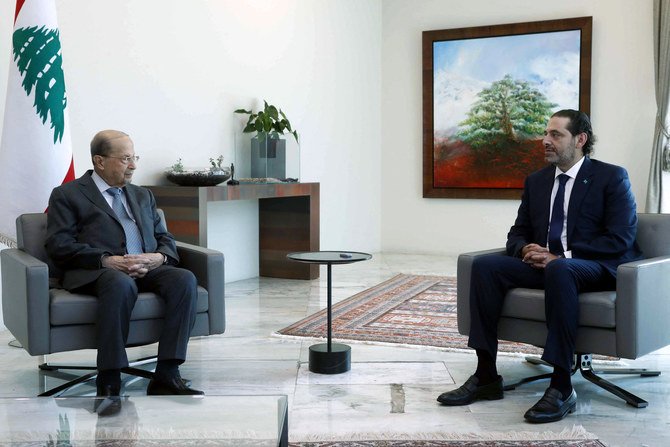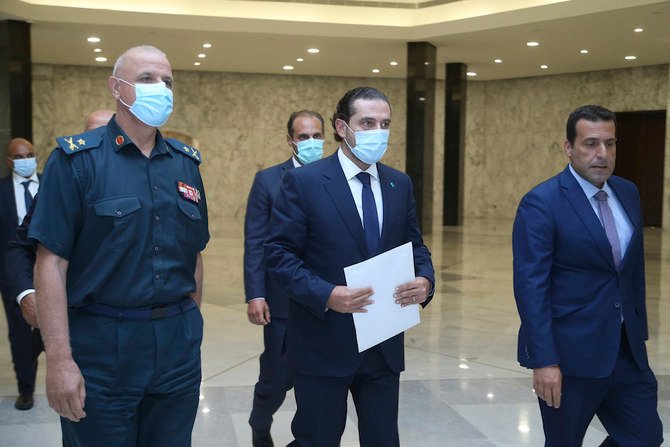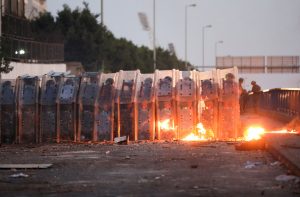



Najia Houssari
BEIRUT: Lebanon’s Prime Minister-designate Saad Hariri stepped down on Thursday, citing “key differences” with President Michel Aoun after nine months of political wrangling that failed to form a government for the crisis-ridden country.
Following his second meeting with the president in the past 24 hours, Hariri announced that “Aoun’s position has not changed.”
The two men held their 19th meeting on Wednesday, with Hariri presenting a lineup for a 24-member cabinet.
“God help this country,” Hariri said. “Aoun requested fundamental changes to the cabinet lineup I had presented to him on Wednesday, related to the naming of Christian ministers. He told me that we would not be able to reach an agreement.”
Aoun’s office hit back in a statement, saying that Hariri “was not ready to discuss amendments of any kind.”
The president said he would set a date for binding parliamentary consultations as soon as possible to assign an alternative figure to take over the task of forming a government.
Following Hariri’s move, the Lebanese pound hit a new low and was selling for higher than LBP20,000 to the dollar on the black market.
The resignation and the sharp rise in the price of the dollar sparked angry protests that spread in Beirut, Sidon, Tripoli and Baalbek.
Protesters destroyed restaurants and cafes and expelled customers from these establishments in the southern city of Tyre.
In Beirut, streets were blocked and there were clashes with soldiers in the vicinity of Beirut Arab University, leaving some injured.
In Tripoli, there were repeated calls through loudspeakers for people to take to the streets.
Relations between Aoun and Hariri were under great strain because of the political differences and disputes between the president and his political party, the Free Patriotic Movement (FPM), on one side and Hariri’s Future Movement on the other.
Dr. Harith Suleiman, an academic and political writer, said he was not shocked to see Lebanon reach this impasse as Aoun had been “hindering all attempts” to form a rescue government for the past nine months.
“Aoun does not want Hariri to head the government and is insisting on giving the blocking third to himself and his political party to be able to sack the government whenever he feels like it,” he told Arab News. “He wants the blocking third to be solely given for his party, without Hezbollah, because he does want Hezbollah to be able to apply pressure in case it was to support a presidential candidate other than the FPM’s candidate, Gebran Bassil.
“It is not easy now to name a well-respected Sunni figure who would resist Aoun and his son-in-law, Gebran Bassil, to form a government that would stop the collapse. Bassil wants a premier who would be willing to work for him and take his orders.”

Regarding the failure of foreign pressure to reach a solution in Lebanon, Suleiman added: “We will remain hostages until the conclusion of the American-Iranian talks in Vienna. How can foreign countries ask us to save ourselves while we are hostages? Can the kidnapped rebel against their kidnappers?”
Former lawmaker Fares Souaid said Aoun was still in the presidential palace “only because of Hezbollah.”
“In the confrontation of political forces, the public opinion and the Arab and international decision-making bodies, the situation is worse than dangerous,” he added.
The US State Department said that Secretary of State Antony Blinken would discuss with his French counterpart Jean-Yves Le Drian the efforts exerted to address the situation in Lebanon, adding that “Lebanon’s leaders must form a government able to carry out reforms to end the crisis.”
On Thursday, the US ambassador to Lebanon Dorothy Shea and her French counterpart Anne Grillo handed a joint letter to Aoun from Blinken and Le Drian in which they stressed “their countries’ interest in the Lebanese situation” and “the need to form a government soon to address the critical situation that Lebanon is facing.”
France on Thursday reiterated its commitment to supporting the Lebanese while sources said that French presidential envoy Patrick Durel met Mohamed Raad, head of Hezbollah’s parliamentary bloc, on Wednesday night.
During a celebration on France’s national day, Grillo addressed the Lebanese and said: “This celebration is held this year in the context of the solidarity that we have been expressing to you for several months, and especially after Aug. 4, 2020, the day of the Beirut port explosion.
“Once again today, I am reiterating to you that France, the French people, and the French residents in Lebanon will always support you. The situation today is urgent and pressing. France has always sought to gather support for Lebanon. At the initiative of the French president and with the support of the UN, a third international conference to support the Lebanese people will be held on Aug. 4. This date will constitute a new milestone … following the two previous conferences that helped raise €250 million ($295.07 million) for Lebanon, including €80 million from France.”